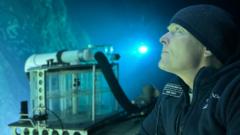Lochridge, who once spearheaded safety for Oceangate, reflects on his unsuccessful attempts to alert officials, exposing systemic flaws in safety oversight that could have prevented the tragedy.
In 2023, the Titan submersible, manned by five individuals—including Oceangate CEO Stockton Rush—met a dire fate when it imploded during its descent to the Titanic wreck. David Lochridge, the company’s former Director of Marine Operations and the whistleblower who raised safety concerns back in 2018, shared his anguish over the incident. His previous warnings about equipment inadequacies fell on deaf ears, leading him to express that “people were sold a lie” about the submersible's safety and capabilities.
Lochridge’s journey began when he joined Oceangate, excited about the idea of sharing Titanic exploration with paying clients. However, his confidence began to fade as safety standards were neglected during the vessel's construction, including the decision to switch from independent certification to in-house engineering without adequate checks. Even more concerning were issues such as the poorly constructed carbon fiber hull and the lack of third-party safety assessments, which Lochridge continually advocated for.
After raising his concerns internally, Lochridge found himself facing hostility from his superiors. Despite providing thorough documentation to the Occupational Safety and Health Administration (OSHA) and urging immediate action, he felt that the system failed him, ultimately leading to his firing and a prolonged legal battle that drained him and his family.
It wasn't until after the Titan's tragic implosion that the U.S. Coast Guard acknowledged Lochridge's alarm signals and highlighted the systemic failures in safety oversight. The report revealed that the slow response from OSHA, who transferred his complaint to the Coast Guard, left Lochridge vulnerable and the public at risk.
Although Oceangate has ceased operations following this incident, the devastation inflicted by the Titan disaster serves as a grim reminder of the critical importance of safety in extreme environments. In a poignant conclusion, Lochridge’s statement reflects the need for future preventive measures to ensure that no such tragedy occurs again: "It should have been stopped.”
In 2023, the Titan submersible, manned by five individuals—including Oceangate CEO Stockton Rush—met a dire fate when it imploded during its descent to the Titanic wreck. David Lochridge, the company’s former Director of Marine Operations and the whistleblower who raised safety concerns back in 2018, shared his anguish over the incident. His previous warnings about equipment inadequacies fell on deaf ears, leading him to express that “people were sold a lie” about the submersible's safety and capabilities.
Lochridge’s journey began when he joined Oceangate, excited about the idea of sharing Titanic exploration with paying clients. However, his confidence began to fade as safety standards were neglected during the vessel's construction, including the decision to switch from independent certification to in-house engineering without adequate checks. Even more concerning were issues such as the poorly constructed carbon fiber hull and the lack of third-party safety assessments, which Lochridge continually advocated for.
After raising his concerns internally, Lochridge found himself facing hostility from his superiors. Despite providing thorough documentation to the Occupational Safety and Health Administration (OSHA) and urging immediate action, he felt that the system failed him, ultimately leading to his firing and a prolonged legal battle that drained him and his family.
It wasn't until after the Titan's tragic implosion that the U.S. Coast Guard acknowledged Lochridge's alarm signals and highlighted the systemic failures in safety oversight. The report revealed that the slow response from OSHA, who transferred his complaint to the Coast Guard, left Lochridge vulnerable and the public at risk.
Although Oceangate has ceased operations following this incident, the devastation inflicted by the Titan disaster serves as a grim reminder of the critical importance of safety in extreme environments. In a poignant conclusion, Lochridge’s statement reflects the need for future preventive measures to ensure that no such tragedy occurs again: "It should have been stopped.”





















